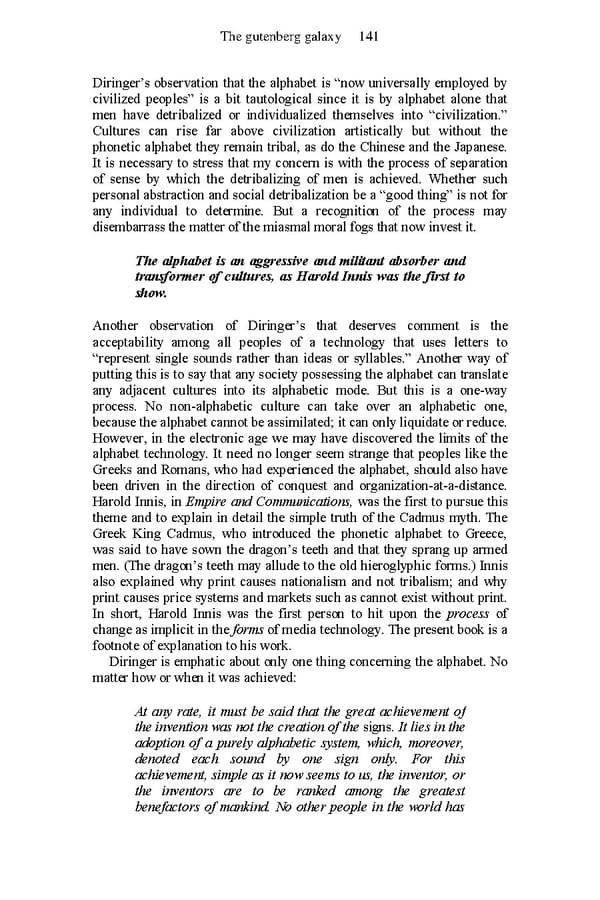The gutenberg galaxy 141 Diringer’s observation that the alphabet is “now universally employed by civilized peoples” is a bit tautological since it is by alphabet alone that men have detribalized or individualized themselves into “civilization.” Cultures can rise far above civilization artistically but without the phonetic alphabet they remain tribal, as do the Chinese and the Japanese. It is necessary to stress that my concern is with the process of separation of sense by which the detribalizing of men is achieved. Whether such personal abstraction and social detribalization be a “good thing” is not for any individual to determine. But a recognition of the process may disembarrass the matter of the miasmal moral fogs that now invest it. The alphabet is an aggressive and militant absorber and transformer of cultures, as Harold Innis was the first to show. Another observation of Diringer’s that deserves comment is the acceptability among all peoples of a technology that uses letters to “represent single sounds rather than ideas or syllables.” Another way of putting this is to say that any society possessing the alphabet can translate any adjacent cultures into its alphabetic mode. But this is a one-way process. No non-alphabetic culture can take over an alphabetic one, because the alphabet cannot be assimilated; it can only liquidate or reduce. However, in the electronic age we may have discovered the limits of the alphabet technology. It need no longer seem strange that peoples like the Greeks and Romans, who had experienced the alphabet, should also have been driven in the direction of conquest and organization-at-a-distance. Harold Innis, in Empire and Communications, was the first to pursue this theme and to explain in detail the simple truth of the Cadmus myth. The Greek King Cadmus, who introduced the phonetic alphabet to Greece, was said to have sown the dragon’s teeth and that they sprang up armed men. (The dragon’s teeth may allude to the old hieroglyphic forms.) Innis also explained why print causes nationalism and not tribalism; and why print causes price systems and markets such as cannot exist without print. In short, Harold Innis was the first person to hit upon the process of change as implicit in the forms of media technology. The present book is a footnote of explanation to his work. Diringer is emphatic about only one thing concerning the alphabet. No matter how or when it was achieved: At any rate, it must be said that the great achievement of the invention was not the creation of the signs. It lies in the adoption of a purely alphabetic system, which, moreover, denoted each sound by one sign only. For this achievement, simple as it now seems to us, the inventor, or the inventors are to be ranked among the greatest benefactors of mankind. No other people in the world has
 Essential McLuhan Page 147 Page 149
Essential McLuhan Page 147 Page 149